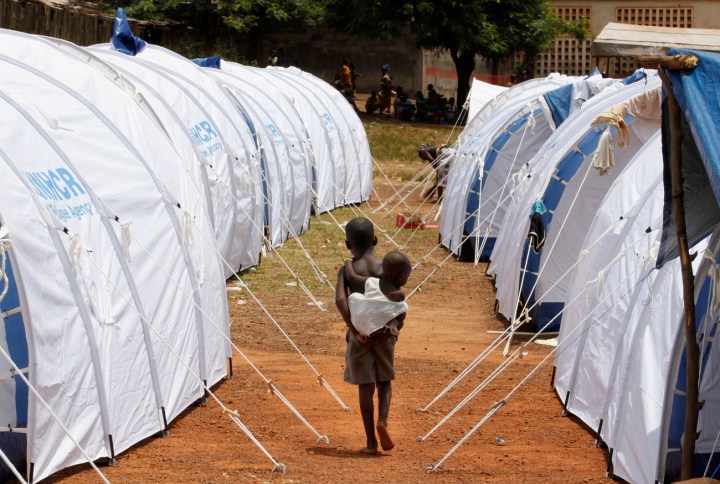At the height of the 2011 crisis in Côte d’Ivoire an estimated 200,000 men, women and children sought asylum in neighbouring states, while another million people were displaced within the country. Now, as rebuilding resumes, they’re making their way home. Among them, children who found themselves in refugee camps without their parents. By KHADIJA PATEL.
After months of living in a refugee camp in Liberia, a 17-year-old Ivorian girl is told her family has been located. She can return home. “It’s fine to go back to my country,” she says “But I think of school. My uncle doesn’t have enough money for me. If I want to enrol in school I need to pay every day.” Célestine Toualy is one of more than 600 Ivorian children who fled Côte d’Ivoire without her parents.
When fighting between rival forces encroached on her village, Célestine grabbed her seven-year-old nephew, Mohammed, and fled to the safety of the Bahn refugee camp in neighbouring Liberia. “In our village, they stole our beds and destroyed our houses,” Célestine explains.
“I had no idea where they went,” Célestine’s uncle, Albert Toualy says. “There were gun shots everywhere. Everyone fled. Many people were looking for their children, but the children had scattered.”
The political crisis in Côte d’Ivoire may have stopped with the fall of Laurent Gbagbo, but the human cost of the conflict is yet to be resolved. Families were torn apart, entire villages were razed and livelihoods lost. From the debris of war, refugees have begun to return home, but the effects of the conflict may be felt for generations to come.
The gradual improvement in the security of the country has encouraged the UN to focus on the voluntary repatriation of Ivorian refugees this year. To this end, the United Nations High Commission for Refugees signed tripartite agreements with the governments of Côte d’Ivoire, Liberia and Ghana to assist Ivorians return home.
After a six-hour journey, Célestine and Mohamed too are reunited with their family. “It was such a joyful moment for me when I heard my children had been found,” Albert says.
Now at home they must adjust to the realities of a collapsed health system and an education system in disarray. Célestine’s uncle has assured aid workers she will be sent to school. But aid workers will check to ensure the children are re-integrated successfully and promises of schooling are indeed fulfilled.
Refugee camps offer free education to the children stranded there, but the collapse of the education system does not guarantee children the same at home. So too adults who return home only to find their fields overgrown and their homes destroyed are wont to prefer conditions in the refugee camps.
For children the return can also be a traumatic experience, the journey home dredging up memories of the conflict they escaped. The International Committee of the Red Cross co-ordinates with child protection agencies to prepare the children for their return, but the process remains a long and arduous one.
Timo Luege, an ICRC delegate, says: “One of the biggest challenges when reuniting families, particularly with small children, is to get the right information. Sometimes, they don’t know the names of their parents. For them, it is just Mama and Papa.”
Using the children’s drawings of their villages and asking what they remember, the Red Cross tries to narrow down the search.
So far, the ICRC has reunited 43 children with their parents in Côte d’Ivoire and restored contact between nearly 420 unaccompanied children and their families. Layal Horanieh an ICRC official in Côte d’Ivoire told iMaverick six children, the youngest of them four-years old and all coincidentally from the same village, had been reunited with their families. “It was a magnificent sight,” she says. And in the midst of the jubilation she describes the memories of pain evoked by the children’s return. “A woman began to weep, holding on to the children she asked why they had to see so much suffering.”
And yet for the lands to be tilled again and children to learn, that suffering must be tempered with the demands of the day.
The UNHCR anticipates the return of some 55,000 refugees, as well as some 72,000 internally displaced people, during the course of this year.
On Wednesday Catherine Bragg, assistant secretary general for humanitarian affairs and deputy emergency relief coordinator for the UN, warned that the humanitarian crisis in the country remained dire.
“Assistance to the most vulnerable persons remains an absolute priority, especially in the country’s western and south-western regions,” she said.“Considerable needs remain in areas such as protection of civilians, restoration of means of livelihood, shelter, access to basic services and voluntary return and reintegration of displaced persons and refugees.”
“A premature exit of humanitarian players could aggravate the situation,” she warned ominously. And children stand to be worst affected if aid agencies begin to withdraw from the country. DM
Read more:
- Côte d’Ivoire: the difficult return of refugees and other displaced people in Star Africa;
- Ivorian refugees return from Liberia in UN-supported voluntary repatriation in UN News Centre;
- Video: Côte d’Ivoire: lost children return home
Photo: Reuters.






















 Become an Insider
Become an Insider